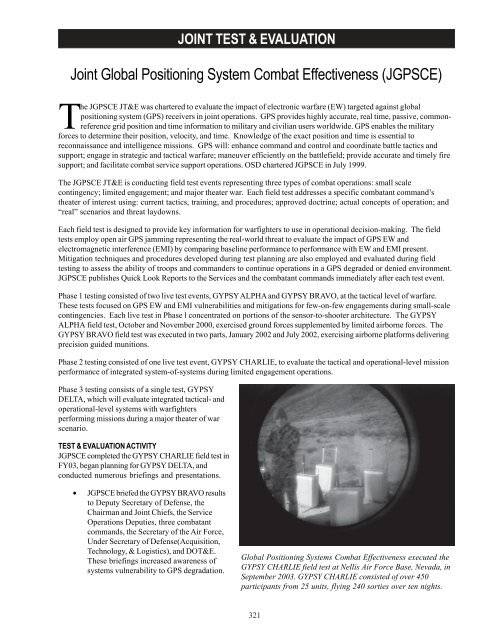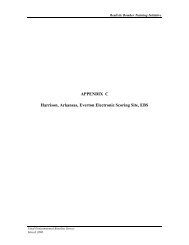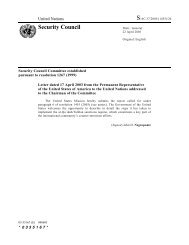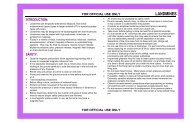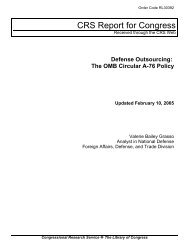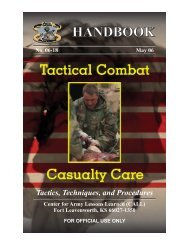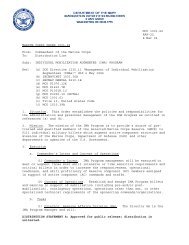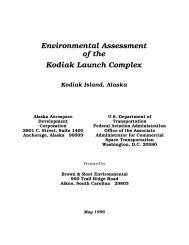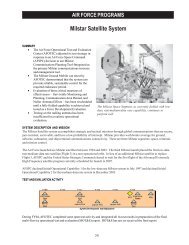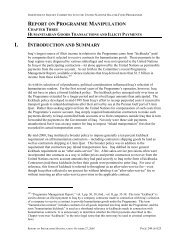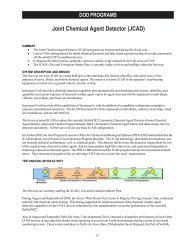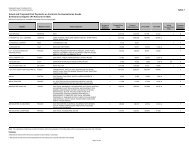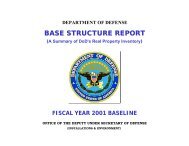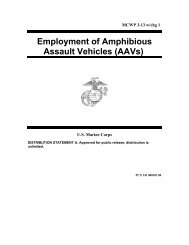19 MB PDF - GlobalSecurity.org
19 MB PDF - GlobalSecurity.org
19 MB PDF - GlobalSecurity.org
You also want an ePaper? Increase the reach of your titles
YUMPU automatically turns print PDFs into web optimized ePapers that Google loves.
JOINT TEST & EVALUATION<br />
Joint Global Positioning System Combat Effectiveness (JGPSCE)<br />
The JGPSCE JT&E was chartered to evaluate the impact of electronic warfare (EW) targeted against global<br />
positioning system (GPS) receivers in joint operations. GPS provides highly accurate, real time, passive, commonreference<br />
grid position and time information to military and civilian users worldwide. GPS enables the military<br />
forces to determine their position, velocity, and time. Knowledge of the exact position and time is essential to<br />
reconnaissance and intelligence missions. GPS will: enhance command and control and coordinate battle tactics and<br />
support; engage in strategic and tactical warfare; maneuver efficiently on the battlefield; provide accurate and timely fire<br />
support; and facilitate combat service support operations. OSD chartered JGPSCE in July <strong>19</strong>99.<br />
The JGPSCE JT&E is conducting field test events representing three types of combat operations: small scale<br />
contingency; limited engagement; and major theater war. Each field test addresses a specific combatant command’s<br />
theater of interest using: current tactics, training, and procedures; approved doctrine; actual concepts of operation; and<br />
“real” scenarios and threat laydowns.<br />
Each field test is designed to provide key information for warfighters to use in operational decision-making. The field<br />
tests employ open air GPS jamming representing the real-world threat to evaluate the impact of GPS EW and<br />
electromagnetic interference (EMI) by comparing baseline performance to performance with EW and EMI present.<br />
Mitigation techniques and procedures developed during test planning are also employed and evaluated during field<br />
testing to assess the ability of troops and commanders to continue operations in a GPS degraded or denied environment.<br />
JGPSCE publishes Quick Look Reports to the Services and the combatant commands immediately after each test event.<br />
Phase 1 testing consisted of two live test events, GYPSY ALPHA and GYPSY BRAVO, at the tactical level of warfare.<br />
These tests focused on GPS EW and EMI vulnerabilities and mitigations for few-on-few engagements during small-scale<br />
contingencies. Each live test in Phase l concentrated on portions of the sensor-to-shooter architecture. The GYPSY<br />
ALPHA field test, October and November 2000, exercised ground forces supplemented by limited airborne forces. The<br />
GYPSY BRAVO field test was executed in two parts, January 2002 and July 2002, exercising airborne platforms delivering<br />
precision guided munitions.<br />
Phase 2 testing consisted of one live test event, GYPSY CHARLIE, to evaluate the tactical and operational-level mission<br />
performance of integrated system-of-systems during limited engagement operations.<br />
Phase 3 testing consists of a single test, GYPSY<br />
DELTA, which will evaluate integrated tactical- and<br />
operational-level systems with warfighters<br />
performing missions during a major theater of war<br />
scenario.<br />
TEST & EVALUATION ACTIVITY<br />
JGPSCE completed the GYPSY CHARLIE field test in<br />
FY03, began planning for GYPSY DELTA, and<br />
conducted numerous briefings and presentations.<br />
• JGPSCE briefed the GYPSY BRAVO results<br />
to Deputy Secretary of Defense, the<br />
Chairman and Joint Chiefs, the Service<br />
Operations Deputies, three combatant<br />
commands, the Secretary of the Air Force,<br />
Under Secretary of Defense(Acquisition,<br />
Technology, & Logistics), and DOT&E.<br />
These briefings increased awareness of<br />
systems vulnerability to GPS degradation.<br />
Global Positioning Systems Combat Effectiveness executed the<br />
GYPSY CHARLIE field test at Nellis Air Force Base, Nevada, in<br />
September 2003. GYPSY CHARLIE consisted of over 450<br />
participants from 25 units, flying 240 sorties over ten nights.<br />
321


